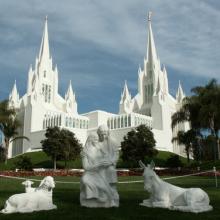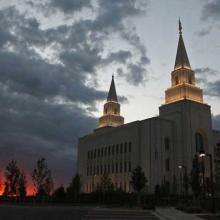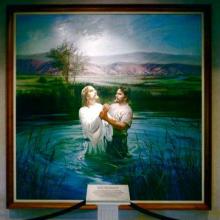Joseph Smith
The first edition, printed in 1830, is most precious to members of the Church of Jesus Christ of Latter-day Saints because Joseph Smith, the faith’s founder, personally oversaw its production in a small storefront printer’s shop in Palmyra, N.Y. Thousands of Mormons visit a restored version of the shop in Palmyra each year.
In 1831, Mormon founder Joseph Smith declared that the righteous would gather in Independence, Mo., to greet the Second Coming of Jesus Christ — just one of the prophecies that estranged his faith from traditional Christianity.
Thousands of converted Mormons moved from Ohio and upstate New York to claim their New Jerusalem. Disputes with Missourians led to a bloody Mormon War that ended only when the state's governor issued an "extermination order" to expel Smith's followers.
Today, few places are better to contemplate the evolving — but still uncertain — relationship between Mormonism and the country where it was founded.
On the one hand, Missouri symbolizes how far Mormons have come. At least 66,000 Mormons now live in the state, more than triple the number of just three decades ago. Most recently, the LDS church has built a temple in Kansas City, Mo., near the epicenter of the Mormon War.
But Missouri also serves to highlight the intractable differences between mainstream Christianity and Mormon theology.
As an 11-year-old boy, Don Bradley went looking for gold plates.
After all, Mormon founder Joseph Smith said he was directed to a set of such plates, buried in a hill near his house in upstate New York.
On a childhood visit to that hill, Bradley turned over lots of rocks, feeling certain he might find some sacred record overlooked by others.
That quest for Mormon gold became a metaphor for Bradley's lifelong spiritual journey. It led him first to dig into Smith's history to enhance his LDS devotion and then to uncover uncomfortable facts and omissions in the faith's story, which bred disillusionment and distance.
Eventually, Bradley's research helped bring him back to the Mormon fold, this time with a broader view of Smith's spiritual abilities.
"I could describe many of the events of Joseph Smith's life, but I couldn't explain the thing that really mattered: why it all worked," Bradley, now 42, said in a July speech at the annual Sunstone Symposium, a conference in Salt Lake City for Mormon intellectuals. "Joseph Smith wasn't of interest because he'd been a merchant, a mayor, or even a much-married husband, but because he was the founder of a religion. And it was precisely the religious dimension I couldn't account for."
Besides rediscovering Mormonism, Bradley learned how to balance faith and facts, science and spirituality, reason and revelation.
The Mormon church is lashing back at a business magazine that parodied their prophet’s mission and portrayed the church as lucratively rich but miserly with charitable donations.
A lengthy story in Bloomberg Businessweek that hits newsstands on Friday details The Church of Jesus Christ of Latter-day Saints’ vast financial holdings, from a $2 billion mall in Salt Lake City to a $1 billion ranch in Florida.
Reaction to the magazine’s cover has overshadowed the article, however. The illustration satirizes the moment when Mormons believe John the Baptist bestowed the priesthood on Joseph Smith, the faith's founding prophet.
In the parody, John the Baptist tells Smith, “and thou shalt build a shopping mall, own stock in Burger King, and open a Polynesian theme park in Hawaii that shall be largely exempt from the frustrations of tax ...” Smith answers, “Hallelujah.”
LDS church spokesman Michael Purdy said the magazine cover is “in such poor taste it is difficult to even find the words to comment on it.”

Mitt Romney speaking in Detroit, Feb. 2012. Photo via Wylio http://bit.ly/KqqDbi
It's no wonder that Mitt Romney won plaudits from evangelical bigwigs for his commencement speech at Liberty University on Saturday. It showed he's learned how to talk to them--or at least, learned to listen to the people who know how he's supposed to talk to them.
When he was running for president last time, Romney told the bigs that he was pretty much like them in considering Jesus his Lord and Savior. But if there's anything evangelicals don't like, it's Mormons claiming to be Christians like them. Then he gave a speech declaring that, like a presidential candidate half a century earlier, he did not "define my candidacy by my religion. A person should not be elected because of his faith nor should he be rejected because of his faith." But evangelicals (these days) don't much believe in Kennedyesque separation of faith and public office.
The Church of Jesus Christ of Latter-day Saints has apologized for a Mormon who baptized the late parents of famed Nazi-hunter Simon Wiesenthal. But despite calls this week from Holocaust survivor and Nobel laureate Elie Wiesel (and others) to rethink the controversial rite, the church is unlikely to drop it entirely.
Latter-day Saints trace posthumous baptism to the Apostle Paul, who wrote in 1 Corinthians 15:29, "Else what shall they do which are baptized for the dead, if the dead rise not at all? Why are they then baptized for the dead?" Mormons believe that Joseph Smith, their faith's founding prophet, restored the apostolic practice after centuries of neglect by mainstream Christians.
Proxy baptism was also Smith's answer to a classic Christian conundrum: What happens to people who, through no fault of their own, did not join the church during their earthly lifetime? Should they be barred from heaven?
Mormons believe that vicarious baptisms give the deceased, who exist in the afterlife as conscious spirits, a final chance to join the Mormon fold, and thus gain access to the Celestial Kingdom. To Mormons, only members of the LDS priesthood possess the power to baptize.

LDS temple in San Diego, Calif. Image via http://bit.ly/zivRxd
A Mormon student surfs the Internet for a school assignment and discovers that Mormon founder Joseph Smith had multiple wives, even marrying a 14 year old.
A returned Mormon missionary, preparing a Sunday school lesson, comes across a website alleging that the Book of Mormon was plagiarized from a novel.
Surprised by what they find so easily online, more and more Mormons are encountering crises of faith. Some even leave the fold and, feeling betrayed, join the ranks of Mormon opponents.
It's a growing problem, acknowledges Marlin Jensen, the outgoing historian for the Church of Jesus Christ of Latter-day Saints, and it's one Mormon leaders are working to confront.
"Never before have we had this information age, with social networking and bloggers publishing unvetted points of view," Jensen said. "The church is concerned about misinformation and distorted information, but we are doing better and trying harder to get our story told in an accurate way."
The church "has made no effort to hide or obscure its history," Jensen said, but some aspects — such as polygamy — "haven't been emphasized often because they were not necessarily germane to what is taught at present."
Can the LDS church do better to explain its history, even to its own members? Sure, Jensen said.

Brigham Young, Mormon leader and Western pioneer. Via Wiki Commons http://commons.wikimedia.org/wiki/File:Brigham-young.jpg
With Mormonism frequently in the news, do you wish you knew more about its beliefs and practices? Cathy Lynn Grossman has a good basic summary, and a comparative chart to Christian denominations.




